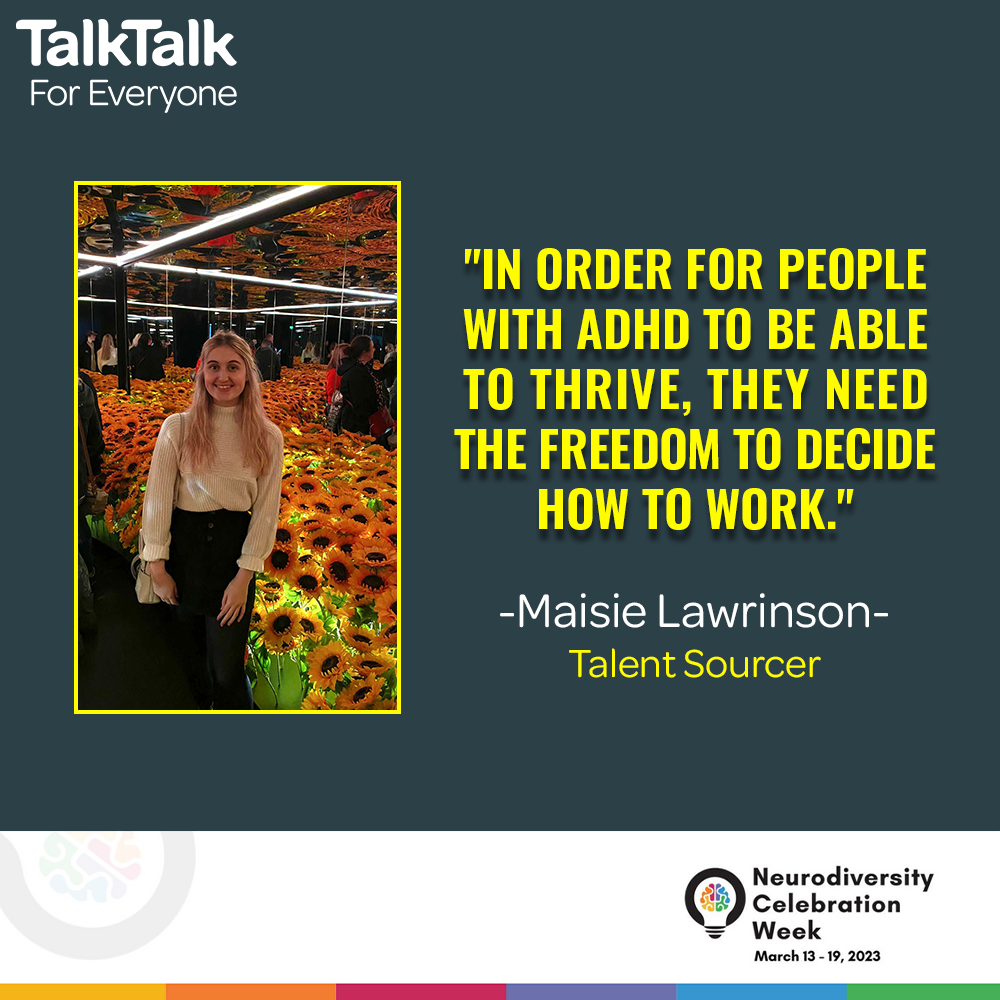This week is Neurodiversity Celebration Week, a worldwide initiative to challenge the myths and stereotypes surrounding neurological differences.
Maisie Lawrinson is a Talent Sourcer on the talent acquisition team at TalkTalk. She told us all about her experience of being diagnosed with ADHD as an adult – and how the support from our employee network TalkNeurodiversity has helped her to manage this and see positives through it.
Maisie, tell us about your experience of being diagnosed with ADHD
After doing a lot of research online, I finally decided to call my doctor to say I think I might have ADHD. I was then booked in for a telephone consultation where I had to answer around 20 questions on a scale of “Never to Always.” Along with a discussion about how it impacts my day-to-day life and why I want to be diagnosed.
Just over a year and a half later I received a call back where I was booked in to be prescribed medication. This was a Zoom call which lasted around an hour. I had to talk about my childhood, how long I’ve been struggling and loads of other things you wouldn’t want to discuss with someone you don’t know.
What did the diagnosis change for you?
Having a diagnosis gave me an answer - it felt like completing a puzzle that I didn’t know was unfinished. So many things finally began to make sense and I didn’t feel as bad about all the essay feedback that said I 'got lost whilst writing', or all the times I had been told off for daydreaming. Even with an answer though, nothing really changed. I still struggle with all of the things I struggled with before my diagnosis, but now I at least understand why, and I can help the people around me understand a little more.
How does your ADHD affect you at work?
My work life consists of a million to do lists, colour coding everything and endless sticky notes. If something isn’t written down, I will forget it! Small tasks can often become really overwhelming, which leads to putting them off. It is hard to feel any sense of accomplishment because it feels like fighting a never-ending battle, which is why I find to-do lists so helpful – a clear visual on my progress. An instant hit of dopamine when I cross something off, gives me the motivation to carry on and avoid distractions.
What myths/stigmas surround ADHD in the workplace? How can these be challenged?
I’m really fortunate in the fact that I haven’t faced any stigmas in the workplace, but I am aware it does happen. My role allows me to work in a way that suits me best and I know many people don’t have this luxury. I think in order for people with ADHD to be able to thrive, they need the freedom to decide how to work.
I do think there is a myth that people with ADHD can’t sit still/focus, but this isn’t entirely true! However, if I am in a meeting for longer than an hour, I will not be able to focus on what is being said and I definitely won’t retain any of the information shared. During my time as a teacher, I always gave my class frequent 'brain breaks' and I think these are just as important for adults as they are for children.
What is the broader narrative you’ve seen around ADHD? How should it change?
From my experience when researching or discussing ADHD, everything is overwhelmingly negative. Most medical websites only outline the problems which come with ADHD and it’s really hard to find any positives. Alongside this, most of the things I’ve found online only refer to children which can feel really demeaning as an adult who was recently diagnosed.
It’s taken me a long time to be able to see any positives, and it’s still something I struggle with. I think the more we discuss it, the easier it will become. Before speaking to people within TalkNeurodiversity, the TalkTalk employee network, I genuinely wouldn’t have been able to name a single positive of having ADHD.
There are so many positives that come with ADHD such as being innovative and being able to hyper focus on the things you are passionate about, with immense attention to detail. Having great people skills and very high EQs allows us to be great as part of a team!
